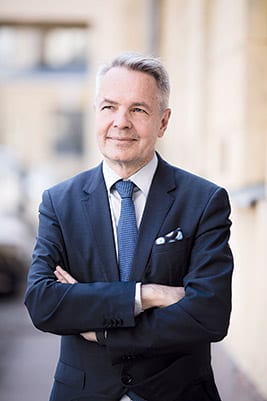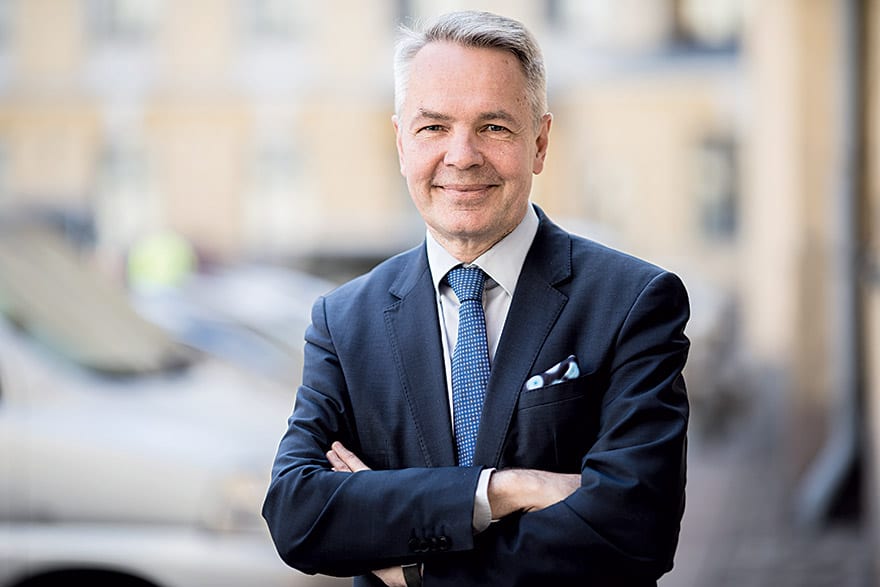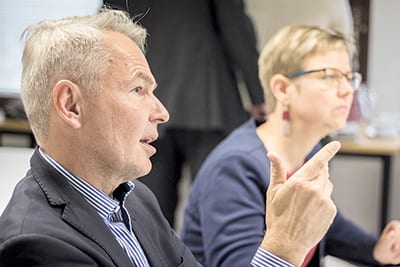The Finnish Presidency will maintain a focus on the enlargement policy, which we consider a strategic investment in peace, stability and prosperity in Europe. The Western Balkans is at the heart of Europe, both geographically and historically, and negative developments in the Western Balkans would sooner or later cause negative consequences in Europe, including Finland…
Finland has no doubt that the unity of the EU is more important today than ever, and it intends to use its Presidency to do its best to promote this – says Finnish Foreign Minister Pekka Haavisto. “Our priorities are to strengthen the EU’s position as a global leader on climate action, strengthen common values and the rule of law, make the EU more competitive and socially inclusive, and to protect the security of citizens comprehensively.”
Finland also has a very clear stance on the importance of the EU enlargement process. Apart from political and economic reasons, which point to the necessity of making the Western Balkans part of the EU, Minister Haavisto, has another one. While travelling by train around the countries of the Western Balkans last year, he met many young people from the region who have a strong European identity and eagerness to participate in building a better European Union.
 Indeed, this is a demanding task that requires a lot of work, especially in the domain of the rule of law, as our interlocutor clearly states.
Indeed, this is a demanding task that requires a lot of work, especially in the domain of the rule of law, as our interlocutor clearly states.
On the bilateral front, Finland and Serbia are celebrating 90 years of diplomatic relations. According to Minister Haavisto, “it is important that we have more concrete cooperation between people, academia and businesses, as well as an active dialogue at the political level”.
The Finnish presidency of the Council of the EU coincides with the electing of new leaders of European institutions. Are you satisfied with the distribution of functions and the personnel solutions for key positions within the Union?
It is important that an agreement on the high-level appointments has been reached. I am particularly happy with the gender balance. A swift return to a normal working rhythm is in our common interest. As we hold the Presidency, we will build up close and constructive relations with the new institutional actors.
Many young people in the region have a strong European identity and are eager to participate in building a better European Union
Complaints have been heard from some EU member states regarding the fact that the choice for people in key EU positions has been dominated by Germany and France, disregarding other members – particularly those from Central and Eastern Europe, even bringing into question the democratic principle of selecting officials. How would you respond to such an assessment?
The outcome of the European Council on high-level appointments was consensual. The package did not divide member states either geographically or politically. The unity of the EU is today more important than ever. Only a strong and united Union can make a difference in Europe and globally. We will do our best to promote this during our presidency.
Do you believe that during the Finnish Presidency, in October, the UK will finally exit the EU; could something else be done to change the conditions of this “divorce”?
The ball is still in the UK’s court. It is up to the UK how it wants to proceed. We naturally want to avoid a disorderly Brexit and establish a future relationship that is as close as possible with the UK. We look forward to working together on these issues with the next UK Prime Minister. The withdrawal agreement, however, is not open for renegotiation, but we are open for talks when it comes to the Declaration on future UK-EU relations.
Given that the EU is facing huge challenges and the need for internal reforms, will it be possible for Finland to add some new quality to the process of expanding the EU to encompass the countries of the Western Balkans?
 The Finnish Presidency will maintain a focus on the enlargement policy, which we consider a strategic investment in peace, stability and prosperity in Europe. Committing to core European values remains essential for all partners aspiring to join the EU one day.
The Finnish Presidency will maintain a focus on the enlargement policy, which we consider a strategic investment in peace, stability and prosperity in Europe. Committing to core European values remains essential for all partners aspiring to join the EU one day.
The rule of law is an important priority for the Finnish government, and it will be high on our enlargement agenda. We also want to emphasise the role of the youth, as well as civil society, in the creation of a better Europe.
Do you believe that North Macedonia and Albania will formally commence EU membership accession negotiations this autumn?
The Council will continue its consideration of the Commission’s recommendations to open accession negotiations with North Macedonia and Albania this autumn. Finland supports these steps.
We will do our best to facilitate the reaching of clear and substantive decisions in the Council. Also in this context, I would like to stress how important it is that both countries continue to make tangible progress on reforms and in their implementation.
You stated in another recent interview that the expansion of the EU is in the interests of Finland. Could you explain why that is so – given that it seems that not all EU member states share that stance?
Finland’s interest in Europe is to promote stability, peace and sustainable development. I consider the enlargement framework a strong and quite unique instrument to advance those goals.
The Western Balkans is at the heart of Europe, both geographically and historically, and negative developments in the Western Balkans would sooner or later cause negative consequences in Europe, including Finland. After all, we Europeans are in the same boat.
The Finnish economy has profited from the enlargement of the EU over the course of the years. Finnish companies are active in the Baltic countries and in Central Europe.
They should have the same opportunities to do business and invest in the Western Balkans. That is obviously a two-way road. We hope to see more economic activity between the Western Balkans and Finland.
We hope to see more economic activity between the Western Balkans and Finland
You’ve drawn attention to the fact that the road to EU accession is long and demands a lot of work. You’ve also noted in particular that the countries of the Western Balkans must show greater progress in the area of the rule of law and the struggle against corruption. How do you see the position of Serbia in these areas today?
Finland supports the European perspective of Serbia. I believe that the place of Serbia one day is in the EU, but – as you say – that still requires consistent work.
It is important that Serbia continues with EU-related reforms and particularly their implementation. I would like to highlight the importance of further work in the fight against corruption and for the rule of law and media freedom.
As I see it, the reforms are not being implemented for the EU, but rather they bring benefits to citizens of Serbia regardless of how membership negotiations proceed.
You announced that reaching an agreement on the normalisation of relations between Serbia and Kosovo is becoming the new focus of the region, following the resolving of the name issue for North Macedonia. Could you attempt to define what the final “normalisation of relations” would be, because there isn’t even accord on that issue within the EU itself?
We strongly encourage both Serbia and Kosovo to continue the dialogue and remain committed to it. The EU is committed to supporting and facilitating that dialogue.
 Progress in the dialogue is the only way for Serbia and Kosovo to advance on their respective paths to the EU. The dialogue is also key to stability in the region.
Progress in the dialogue is the only way for Serbia and Kosovo to advance on their respective paths to the EU. The dialogue is also key to stability in the region.
The full normalisation of relations between Serbia and Kosovo will bring concrete advantages for citizens of both parties. The content of a legally-binding agreement addressing all outstanding issues is for the two parties to define. A solution cannot be imposed from outside, yet the content must be fully compatible with international law, the EU acquis, and supported by the region.
Could you tell us more about your experience of travelling around the countries of the Western Balkans by train last year. What were your strongest impressions?
Some of the most interesting discussions were with young people. I believe they will have a key role to play in focusing on the future instead of dwelling on historical burdens. Many young locals had a strong European identity and were eager to participate in building a better European Union. These discussions were very inspiring and strengthened my belief that the EU should play a stronger role in the Western Balkans and keep the door open for EU membership.
As I see it, the reforms are not being implemented for the EU, but rather they bring benefits to citizens of Serbia regardless of how membership negotiations proceed
Young people from Serbia and across the region plan to leave their home countries in large numbers. This is a problem that’s being faced by other countries, including EU member states. Can this ‘brain drain’ process be stopped?
The brain drain is a serious problem. I believe that the European perspective brings an important vision of a better future for the youth of the Western Balkans. Many young people in the region have a strong European identity and are eager to participate in building a better European Union.
Efforts to address high unemployment, especially among the young, create business opportunities and strengthen skills-based economies that help tackle the brain drain. Moreover, regional cooperation in the areas of education, business and cultural cooperation can create new opportunities for the youth.
To conclude, how would you rate bilateral relations between Finland and Serbia, and in which areas could those relations be advanced?
Relations between Serbia and Finland are excellent. This year is a special one, as we are celebrating 90 years of our diplomatic relations. It is important that we have more concrete cooperation between people, academia and businesses, as well as an active dialogue at the political level.
There is room to further activate our business-to-business cooperation. I firmly believe that Finnish companies could provide interesting solutions in the areas of renewable energy and clean-tech, for example.
The new direct flight connection of Air Serbia between Belgrade and Helsinki facilitates business and supports tourism.
Serbia has chosen EU membership as its strategic goal and priority, and Finland fully supports the European perspective of Serbia.
| DIALOGUE
Progress in the dialogue is the only way for Serbia and Kosovo to advance on their respective paths to the EU. The dialogue is also key for stability in the region |
PERSISTENCE
It is important that Serbia continues with EU-related reforms and their implementation. Further work is required in the fight against corruption and for the rule of law and media freedom |
UNITY
Only a strong and united Union can make a difference in Europe and globally. We will do our best to promote this during our presidency |
|---|